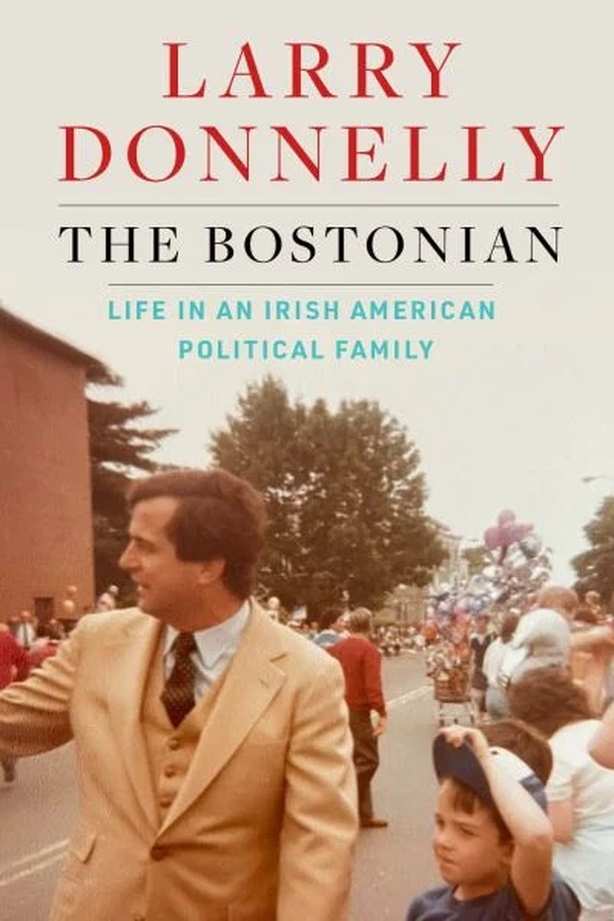RTÉ Morning Ireland presenter Rachael English reviews the new memoir from attorney and lecturer Larry Donnelly, subtitled 'Life In An Irish-American Political Family'.
If you were young in Ireland in the late 1980s, Brian Donnelly's name will be familiar. At the time, unemployment had lurched past fifteen percent, and then Tánaiste, Brian Lenihan, had claimed that we couldn't all live on one small island. Little wonder that the US visa scheme spearheaded by Donnelly turned him into a household name. The programme promised thousands of work visas for Irish people. It received one and a half million applications.
What you might not know about the Boston congressman is that he was far more famous here than in America. Unusually for a politician, he was resolutely low-profile. He was also hugely disappointed when the Clinton administration chose not to make him US Ambassador to Ireland, giving the job instead to Jean Kennedy Smith.
Donnelly is just one member of an intensely political Irish American family whose story is told in a new book by his nephew, Larry. The Bostonian is an unusual book: part memoir, part political analysis, part love-letter to the city of Larry Donnelly’s birth and to his adopted home in Ireland. It’s also a rewarding read especially if, like many Irish people, you’re fascinated by American politics.
We need your consent to load this rte-player contentWe use rte-player to manage extra content that can set cookies on your device and collect data about your activity. Please review their details and accept them to load the content.Manage Preferences
Listen: The Bostonian - Larry Donnelly talks to Claire Byrne
Given his family connection to the Democrats, it comes as a surprise to learn that Larry Donnelly’s first political involvement was with the Republicans. He even ran for the lowest rung of Massachusetts’ local government, a body known as 'the town meeting’.
This flirtation lasted until a combination of law school and a part-time job at Burger King forced him to re-evaluate. ‘It made me realise,’ he writes, ‘that not everyone had the relatively care-free existence with a stable family life and financial and other support that I had always taken for granted.’ He also abandoned ambitions to continue the family tradition of running for public office.
That’s not to say he’s always in agreement with the Democrats. As followers of his media commentary will know, he’s strongly critical of the left of the party for, in his view, failing to give enough priority to disillusioned blue-collar workers. Indeed, a section of the book is titled ‘The View from the Centre’.
America, he contends, is now splintered along multiple fault lines with a lot of the old absolutes having been ‘dented or demolished’. It’s hard to argue. Amid the coverage of America’s most recent mayoral and gubernatorial elections, one result received relatively little attention here. Boston’s next mayor will be Michelle Wu. The daughter of Taiwanese immigrants, she brought to an end decades of election victories by Irish American or Italian-American men.
Donnelly grapples with the complexities of Irish America and with the significance of Joe Biden’s presidency, maintaining that no matter how sentimental or schmaltzy Biden’s pronouncements, Ireland is fortunate that he’s in the White House.
The book offers a mostly affectionate portrait of Boston. For instance, anyone who has spent time there will smile in recognition at the anecdotes about the city's sporting obsessions.
It also touches on some of the darker episodes, including the tumult ignited by attempts to racially desegregate schools. What became known as ‘busing’ sparked protests and violence as children were moved between neighbourhoods. Donnelly argues that fear and desperation were the most prominent emotions felt by the white protestors, many of whom were themselves living in extremely poor conditions. He does acknowledge, however, that the violence was often racially motivated and that a seam of racism ran through some of the scheme’s most vocal opponents.

The author's perspective is unusual in that, unlike most Americans of Irish heritage, he chose to make the return journey. Despite his frustrations with domestic politics, in particular the Dáil’s rigid whip system, his fondness for Ireland shines through. More than that, he maintains that unless you’re very wealthy, there’s now more opportunity here than in Boston. America, he writes, is afflicted by 'an epidemic of inequality.’
Throughout the book, Larry Donnelly’s passion for politics and political debate is obvious. Towards the end it becomes apparent that the family business still appeals to him. The Milton Town Meeting may not be his last tilt at public office.
The Bostonian by Larry Donnelly (published by Gill Books) is out now.

